Guilie Castillo-Oriard's Blog, page 13
April 15, 2015
Nèchi -- #Curacao expressions on the #AtoZChallenge 2015
Nèchi
[NEH-chee]
Literally: Nice (cute, beautiful, good-looking)Origin: the Dutch netjes [NET-yes]
Yep. That simple. Nice.
 The Handelskade in Curaçao is probably the most nèchi waterfront in all the Caribbean.
The Handelskade in Curaçao is probably the most nèchi waterfront in all the Caribbean.
(But maybe I'm a tad biased.)
You show up to pick up your new girlfriend and she comes out in a miniskirt and high heels.
You: "Néchi!"
You spend three hours cleaning up your apartment--the works: vacuuming, window-washing, pounding out dust from rugs, polishing wood. At the end, you'd look around you and say, satisfied, "Nèchi."
A friend invites you to visit her home for the first time--a sprawling villa straight out of Architectural Digest. On the tour, you'd probably find yourself saying "Nèchi" several times.
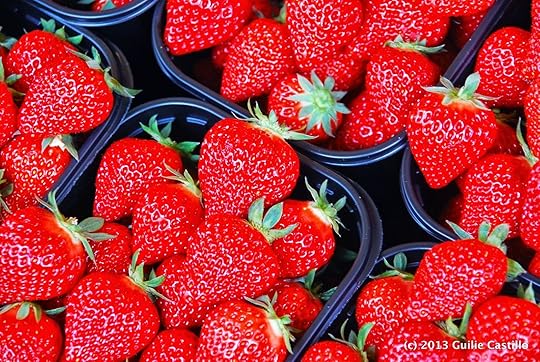 Strawberries in at a market in Holland, looking very nèchi.
Strawberries in at a market in Holland, looking very nèchi.
NOTE: it's more about appearances than character. So if someone is nice to you, you wouldn't say they're nèchi--not unless they're well-dressed, too.
Nèchi. Most often used for clothing, jewelry, and other items of luxury. An artwork can be nèchi. So can a car--and a sweet deal on buying one would definitely be nèchi. A well-behaved dog might be called nèchi--but I've never heard it used on a well-behaved child. A seaside restaurant with soft lighting and lounge-style furnishings would elicit a nèchi... But their food would never be nèchii--unless you were referring to an especially precise presentation.
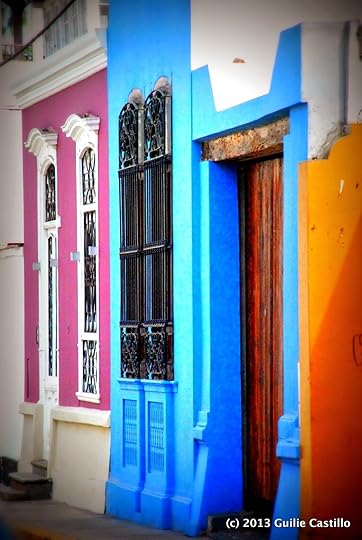 Façades in a nèchi neighborhood of Lima, Perú
Façades in a nèchi neighborhood of Lima, Perú
(No one has guessed yesterday's bonus word yet, so I'll wait until tomorrow to post the answer.)
Yep. That simple. Nice.
 The Handelskade in Curaçao is probably the most nèchi waterfront in all the Caribbean.
The Handelskade in Curaçao is probably the most nèchi waterfront in all the Caribbean.(But maybe I'm a tad biased.)
You show up to pick up your new girlfriend and she comes out in a miniskirt and high heels.
You: "Néchi!"
You spend three hours cleaning up your apartment--the works: vacuuming, window-washing, pounding out dust from rugs, polishing wood. At the end, you'd look around you and say, satisfied, "Nèchi."
A friend invites you to visit her home for the first time--a sprawling villa straight out of Architectural Digest. On the tour, you'd probably find yourself saying "Nèchi" several times.
 Strawberries in at a market in Holland, looking very nèchi.
Strawberries in at a market in Holland, looking very nèchi.NOTE: it's more about appearances than character. So if someone is nice to you, you wouldn't say they're nèchi--not unless they're well-dressed, too.
Nèchi. Most often used for clothing, jewelry, and other items of luxury. An artwork can be nèchi. So can a car--and a sweet deal on buying one would definitely be nèchi. A well-behaved dog might be called nèchi--but I've never heard it used on a well-behaved child. A seaside restaurant with soft lighting and lounge-style furnishings would elicit a nèchi... But their food would never be nèchii--unless you were referring to an especially precise presentation.
 Façades in a nèchi neighborhood of Lima, Perú
Façades in a nèchi neighborhood of Lima, Perú(No one has guessed yesterday's bonus word yet, so I'll wait until tomorrow to post the answer.)
Published on April 15, 2015 22:30
Master! (#AtoZChallenge 2015)
Master!/MAHS-tehrr/
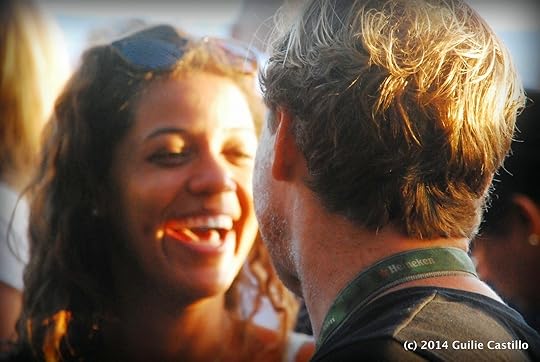
In Curaçao, anything good is dushi --food, people, good times. But if it's beyond good, approaching the extraordinary, then it's master.
(Give that E a full second, and roll the R. Yes. Ei ta palu!)
You're at the Kokomo Full Moon party and you run into some friends.
"Hey, how's it going?"
"Hopi master, swa*!"
(English: F*ckin'-A)
*more on swa for S day
Your contractor finally found the tile your couldn't get anywhere to finish your floor? "Master!"
(English: F*ckin'-A)
Your friend calls to tell you she just landed her dream job? "Hey, hopi master!"
(English: F*ckin'-A)
You've been introduced to the owner of the island's best, trendiest restaurant and he offers to host your birthday party next week--for free.
"Wow! Master!"
(English: F*ckin'-A)
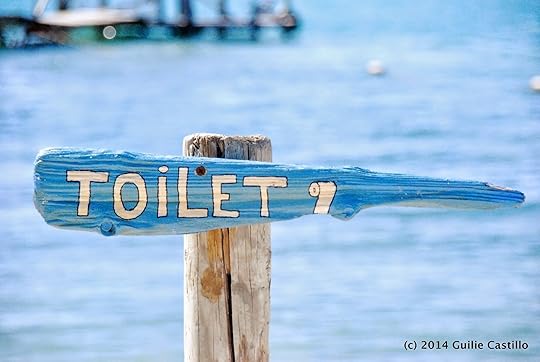 A beach with facilities (and, presumably, toilet paper)?
A beach with facilities (and, presumably, toilet paper)?
"Hopi master!"
Today's bonus (more of a gift, really):
milager [mee-LAH-gehr]
The title of the short-story collection in the giveaway includes this word. Yep. It's that easy :)

In Curaçao, anything good is dushi --food, people, good times. But if it's beyond good, approaching the extraordinary, then it's master.
(Give that E a full second, and roll the R. Yes. Ei ta palu!)
You're at the Kokomo Full Moon party and you run into some friends.
"Hey, how's it going?"
"Hopi master, swa*!"
(English: F*ckin'-A)
*more on swa for S day
Your contractor finally found the tile your couldn't get anywhere to finish your floor? "Master!"
(English: F*ckin'-A)
Your friend calls to tell you she just landed her dream job? "Hey, hopi master!"
(English: F*ckin'-A)
You've been introduced to the owner of the island's best, trendiest restaurant and he offers to host your birthday party next week--for free.
"Wow! Master!"
(English: F*ckin'-A)
 A beach with facilities (and, presumably, toilet paper)?
A beach with facilities (and, presumably, toilet paper)?"Hopi master!"
Today's bonus (more of a gift, really):
milager [mee-LAH-gehr]
The title of the short-story collection in the giveaway includes this word. Yep. It's that easy :)
Published on April 15, 2015 06:26
April 14, 2015
Laf! -- #Curaçao expressions on the #AtoZChallenge 2015
Remember that post about ferfelu and how it differs from its (probable) Dutch root of vervelend? Same case today... but worse. (Well, funnier.)
laf [lahf] (yep... just like "laugh")

but it's not "laugh".
In Papiamentu laf means boring. In Dutch--yes, spelled exactly the same--it means cowardly. (Or, worse, chicken shit.)
You can imagine the confusion.
Dutch Guy asks a Curaçao girl out and suggests a movie and dinner.
Curaçao Girl: "Maybe. What movie?"
DG: "There's that new German one that won the Golden Palm at Cannes."
CG (no fan of art-house films): "Ai no, hopi laf."
She means boring, but he'll hear her insulting his bravery... And there goes that love story, swirling down the drain of cultural non-entendres.
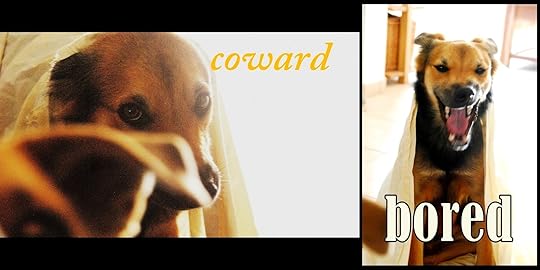 Sam, for instance, becomes a different dog in Dutch and in Papiamentu.
Sam, for instance, becomes a different dog in Dutch and in Papiamentu.
Today's bonus word:
lihé [lee-HEH] Hint: People in Curaçao speak Papiamentu hopi lihé... which makes it hard for us beginners to understand ;)
(Congratulations, Romi C (Letters from the Land of Cherry Blossoms)--you got yesterday's bonus phrase right, and you're in the draw for the collection of Curaçao short stories :) )
laf [lahf] (yep... just like "laugh")

but it's not "laugh".
In Papiamentu laf means boring. In Dutch--yes, spelled exactly the same--it means cowardly. (Or, worse, chicken shit.)
You can imagine the confusion.
Dutch Guy asks a Curaçao girl out and suggests a movie and dinner.
Curaçao Girl: "Maybe. What movie?"
DG: "There's that new German one that won the Golden Palm at Cannes."
CG (no fan of art-house films): "Ai no, hopi laf."
She means boring, but he'll hear her insulting his bravery... And there goes that love story, swirling down the drain of cultural non-entendres.
 Sam, for instance, becomes a different dog in Dutch and in Papiamentu.
Sam, for instance, becomes a different dog in Dutch and in Papiamentu.Today's bonus word:
lihé [lee-HEH] Hint: People in Curaçao speak Papiamentu hopi lihé... which makes it hard for us beginners to understand ;)
(Congratulations, Romi C (Letters from the Land of Cherry Blossoms)--you got yesterday's bonus phrase right, and you're in the draw for the collection of Curaçao short stories :) )
Published on April 14, 2015 18:34
April 13, 2015
Konpolaga! -- #Curaçao expressions on the #AtoZChallenge 2015
It's actually
kon por laga [kohn-pohr-LAH-gah]
but at the speed of speech the R tends to disappear--yes, also from the spelling. You'll find it (and hear it) more often as
konpolaga [kohn-poh-LAH-gah]
What does it mean?
Literally: how can (you? it?) let/leave (it? me? you?)In context: OF COURSE! ABSOLUTELY!
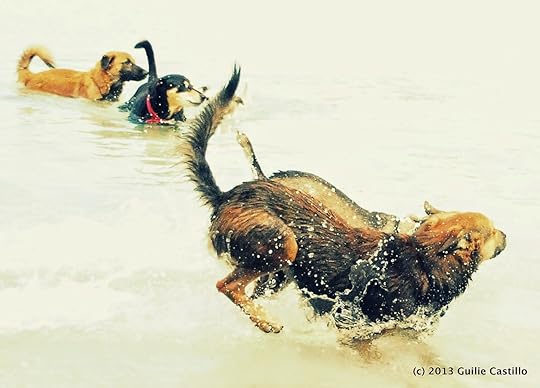 "Your dogs really love the beach, don't they?"
"Your dogs really love the beach, don't they?"
"Konpolaga!"So I'm not really sure how we get from "how can (someone/something) leave or let (someone/something)" to OF COURSE, but... there you have it.
"Hey, I need a favor. Would you [insert special request here] for me?"
"Konpolaga!"
(English: I'd be thrilled to)
"Are you sure this is the right street? It doesn't look familiar."
"Konpolaga! The house is just past the next curve, you'll see."
(English: Abso-f*ckin'-lutely sure)
And, because it's Monday, I say unto all you hopi great bloggers:
bon siman!
(Yes, it's a bonus question ;) Hint: I would only say this on a Monday. Not Tuesday, not Sunday, not any other day of the week.)
kon por laga [kohn-pohr-LAH-gah]
but at the speed of speech the R tends to disappear--yes, also from the spelling. You'll find it (and hear it) more often as
konpolaga [kohn-poh-LAH-gah]
What does it mean?
Literally: how can (you? it?) let/leave (it? me? you?)In context: OF COURSE! ABSOLUTELY!
 "Your dogs really love the beach, don't they?"
"Your dogs really love the beach, don't they?""Konpolaga!"So I'm not really sure how we get from "how can (someone/something) leave or let (someone/something)" to OF COURSE, but... there you have it.
"Hey, I need a favor. Would you [insert special request here] for me?"
"Konpolaga!"
(English: I'd be thrilled to)
"Are you sure this is the right street? It doesn't look familiar."
"Konpolaga! The house is just past the next curve, you'll see."
(English: Abso-f*ckin'-lutely sure)
And, because it's Monday, I say unto all you hopi great bloggers:
bon siman!
(Yes, it's a bonus question ;) Hint: I would only say this on a Monday. Not Tuesday, not Sunday, not any other day of the week.)
Published on April 13, 2015 07:35
April 11, 2015
J is a blank -- #Curacao expressions on #AtoZChallenge 2015
There are no words that start with J in Papiamentu.
 I knew you wouldn't believe me, so here's a screenshot of the dictionary.
I knew you wouldn't believe me, so here's a screenshot of the dictionary.
Last word in the I section is italiano. Then comes the J section. Then comes the K.
No words with J. None.
How cool is that?
(Not that I have anything against J; it's just I find these quirks of Papiamentu fascinating.)
Which leaves me in a bind for the J post. I thought about going up to the beaches of San Juan--breathtaking little coves you totally would love to see, I know it--but, technically, it's San Juan. Same thing with St. Joris, my favorite dog beach.
And then I thought:
Jeremi! [JEH-reh-mee] (yep... just like Jeremy. But the i makes it Curaçao ;) )
 A deserted Jeremi from the sky.
A deserted Jeremi from the sky.
(Image source) (Image source)
(Image source)
 (Image source)
(Image source)
 (Image source)Jeremi Beach. A secluded paradise on the Western tip of the island...
(Image source)Jeremi Beach. A secluded paradise on the Western tip of the island...
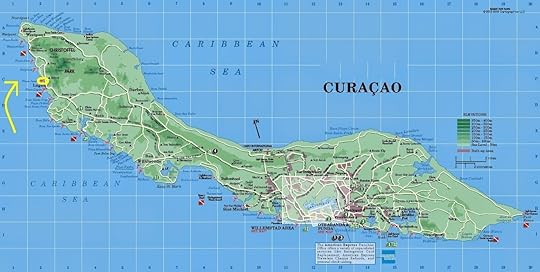 See that yellow circle the yellow arrow is pointing to?
See that yellow circle the yellow arrow is pointing to?
That's Jeremi.Well, secluded during the week. It's a favorite of the locals (Curaçao people are known for their taste), so on weekends it will not look like the photos above.
But during the week? Aahhh...
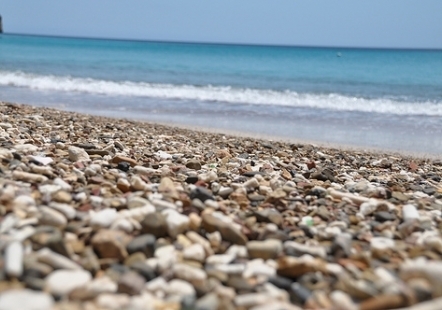 It's such a hard, stressful life, isn't it?
It's such a hard, stressful life, isn't it?
(Image source)
Update on the guessing game:
No one got hofi . I'm floored. I suck. It was too hard, I think, and my hints weren't all that helpful. Hofi is yard, or garden. Dogs need a large enough hofi to live in. There's a new hofi near our place that started a farmer's market, the first in Curaçao.
I apologize. My bad. So here's a new rule: if no one gets the right answer or even comes close, everyone that guessed will have their names added to the raffle. So all of you who took a shot at hofi -- and I love your creativity! -- are now in to win a collection of short stories about Curaçao. Sound fair? The way I see it, you shouldn't have to pay the price for my incompetence :)
Bon wikent! (Care to guess on this one? ;) )
 I knew you wouldn't believe me, so here's a screenshot of the dictionary.
I knew you wouldn't believe me, so here's a screenshot of the dictionary.Last word in the I section is italiano. Then comes the J section. Then comes the K.
No words with J. None.
How cool is that?
(Not that I have anything against J; it's just I find these quirks of Papiamentu fascinating.)
Which leaves me in a bind for the J post. I thought about going up to the beaches of San Juan--breathtaking little coves you totally would love to see, I know it--but, technically, it's San Juan. Same thing with St. Joris, my favorite dog beach.
And then I thought:
Jeremi! [JEH-reh-mee] (yep... just like Jeremy. But the i makes it Curaçao ;) )
 A deserted Jeremi from the sky.
A deserted Jeremi from the sky.(Image source)
 (Image source)
(Image source)
 (Image source)
(Image source)
 (Image source)Jeremi Beach. A secluded paradise on the Western tip of the island...
(Image source)Jeremi Beach. A secluded paradise on the Western tip of the island... See that yellow circle the yellow arrow is pointing to?
See that yellow circle the yellow arrow is pointing to?That's Jeremi.Well, secluded during the week. It's a favorite of the locals (Curaçao people are known for their taste), so on weekends it will not look like the photos above.
But during the week? Aahhh...
 It's such a hard, stressful life, isn't it?
It's such a hard, stressful life, isn't it?(Image source)
Update on the guessing game:
No one got hofi . I'm floored. I suck. It was too hard, I think, and my hints weren't all that helpful. Hofi is yard, or garden. Dogs need a large enough hofi to live in. There's a new hofi near our place that started a farmer's market, the first in Curaçao.
I apologize. My bad. So here's a new rule: if no one gets the right answer or even comes close, everyone that guessed will have their names added to the raffle. So all of you who took a shot at hofi -- and I love your creativity! -- are now in to win a collection of short stories about Curaçao. Sound fair? The way I see it, you shouldn't have to pay the price for my incompetence :)
Bon wikent! (Care to guess on this one? ;) )
Published on April 11, 2015 10:58
April 9, 2015
Infrou -- #Curaçao vocabulary (#AtoZChallenge 2015)
If there is one thing that Curaçao has a lot of, it's cacti. (Kadushi, in Papiamentu.)
 Hopi kadushi, no? ;)
Hopi kadushi, no? ;)
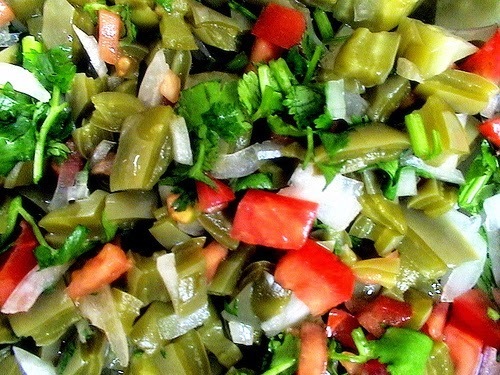 Nopalitos. Just looking at this makes me salivate.
Nopalitos. Just looking at this makes me salivate.
And then, of course, there's peyote, which might not necessarily be nutritious in terms of vitamins or protein but, some will argue, is food for the spirit.
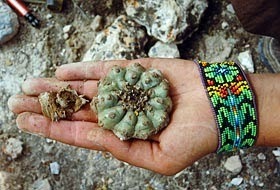 Bite of Nirvana, anyone?
Bite of Nirvana, anyone?
(Image source)No peyote in Curaçao. (Yes, I've looked.) But plenty of nopales. Except they're not called nopales. They're called
infrou [eenf-ROW] as in "row, row, row your boat"
Rather than share an expression today, I chose a name I think is remarkably unique. Where does infrou come from? Not Dutch. Certainly not Spanish. It shares only one letter with prickly pear.
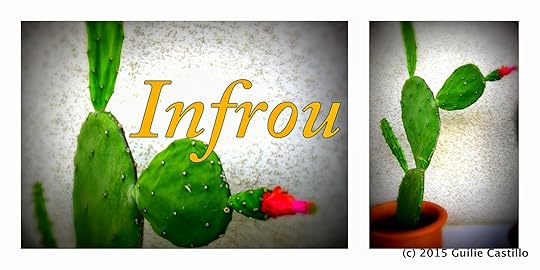
Where does it come from?
Google's no help. A search for infrou got me one result--a link to someone's Facebook page (which, by the way, seems to have absolutely no relationship with anyone of the Cactaceae family). I tried infrou Curacao and got a bit more... But it's still just mentions, no explanations. Plenty of pics, though.
Where. Does. This. Word. COME FROM???
Someone, please put me out of my misery.
(No bonus word today. However, no one has guessed the bonus word from yesterday, so I'll wait until tomorrow to post the answer. Thanks to everyone that's taken a stab at it so far! And sorry for picking such a hard one... I'll do better next time ;) Oh, and a round of applause, please, for Debbie D "Doglady" (and isn't that nickname enough to make you love her?) for posting the correct answer to the G bonus word, galiña. Thanks to everyone who took a shot at that one, too :) )
 Hopi kadushi, no? ;)
Hopi kadushi, no? ;) Nopalitos. Just looking at this makes me salivate.
Nopalitos. Just looking at this makes me salivate.And then, of course, there's peyote, which might not necessarily be nutritious in terms of vitamins or protein but, some will argue, is food for the spirit.
 Bite of Nirvana, anyone?
Bite of Nirvana, anyone?(Image source)No peyote in Curaçao. (Yes, I've looked.) But plenty of nopales. Except they're not called nopales. They're called
infrou [eenf-ROW] as in "row, row, row your boat"
Rather than share an expression today, I chose a name I think is remarkably unique. Where does infrou come from? Not Dutch. Certainly not Spanish. It shares only one letter with prickly pear.

Where does it come from?
Google's no help. A search for infrou got me one result--a link to someone's Facebook page (which, by the way, seems to have absolutely no relationship with anyone of the Cactaceae family). I tried infrou Curacao and got a bit more... But it's still just mentions, no explanations. Plenty of pics, though.
Where. Does. This. Word. COME FROM???
Someone, please put me out of my misery.
(No bonus word today. However, no one has guessed the bonus word from yesterday, so I'll wait until tomorrow to post the answer. Thanks to everyone that's taken a stab at it so far! And sorry for picking such a hard one... I'll do better next time ;) Oh, and a round of applause, please, for Debbie D "Doglady" (and isn't that nickname enough to make you love her?) for posting the correct answer to the G bonus word, galiña. Thanks to everyone who took a shot at that one, too :) )
Published on April 09, 2015 22:30
April 8, 2015
Hesusé! (& Hopi, & Hodé) -- #Curaçao Expressions on the #AtoZChallenge 2015)
Because in Papiamentu the J is pronounced the Dutch way (as Y), any J words sourced from Spanish or Portuguese are spelled with H. Which makes H a popular section in a Papiamentu dictionary. (And my life difficult for J day.)
Hesusé! [heh-soo-SAY] Literally: Jesus-ehIn context: Oh, god (negative), Wow (positive).
In a crowded street, you spot a friend you haven't seen for years. "Hesusé! Is that--?"
Hopi [HOH-pee] many (Papiamentu has hopi words that start with H)very (I'm hopi glad you visited today)very much (I love you hopi) -- but not much; that's masha, coming to a blog near you on M day
A song you'll hear everywhere in Curaçao -- anywhere there's a live band, anyway -- is Dushi, Mi Stimabo (Sweetie, I Love You). The first line of the song says,
"Dushi, mi stimabo hopi..."
Hodé [hoh-DEH] Literally: f*cked, screwed (the dictionary says 'sodomized')In context: your favorite @%$#&* of frustration
(NOTE: not an insult, not even seriously vulgar, but out of place in conversation with, say, your in-laws)
You're running late, and this is your third red light in the last seven minutes. You bang the steering wheel and mutter, "Hodé."
You run out of cigarettes at a party. It's 3 am; everything's going to be closed. Yeah. "Hodé."
(I think this one is borrowed from the Castilian Spanish joder, which has the same meaning and use--and isn't all that impolite in Spain [and Venezuela, I think], but in México would make eyebrows shoot up.)
Today's bonus word (what with H being so popular and all):
hòfi [HOH-fee] Hint: it's not coffee. Okay, that wasn't much of a hint. Here's another:
Take a shot. If you're the first to guess the right answer in the comments (or the closest, if no one gets it right), you'll be entered to win a copy of The Miracle of Small Things, a collection of short stories about Curaçao coming out later this year. The three winners will be announced the first week of May.
Hesusé! [heh-soo-SAY] Literally: Jesus-ehIn context: Oh, god (negative), Wow (positive).
In a crowded street, you spot a friend you haven't seen for years. "Hesusé! Is that--?"
Hopi [HOH-pee] many (Papiamentu has hopi words that start with H)very (I'm hopi glad you visited today)very much (I love you hopi) -- but not much; that's masha, coming to a blog near you on M day
A song you'll hear everywhere in Curaçao -- anywhere there's a live band, anyway -- is Dushi, Mi Stimabo (Sweetie, I Love You). The first line of the song says,
"Dushi, mi stimabo hopi..."
Hodé [hoh-DEH] Literally: f*cked, screwed (the dictionary says 'sodomized')In context: your favorite @%$#&* of frustration
(NOTE: not an insult, not even seriously vulgar, but out of place in conversation with, say, your in-laws)
You're running late, and this is your third red light in the last seven minutes. You bang the steering wheel and mutter, "Hodé."
You run out of cigarettes at a party. It's 3 am; everything's going to be closed. Yeah. "Hodé."
(I think this one is borrowed from the Castilian Spanish joder, which has the same meaning and use--and isn't all that impolite in Spain [and Venezuela, I think], but in México would make eyebrows shoot up.)
Today's bonus word (what with H being so popular and all):
hòfi [HOH-fee] Hint: it's not coffee. Okay, that wasn't much of a hint. Here's another:
Take a shot. If you're the first to guess the right answer in the comments (or the closest, if no one gets it right), you'll be entered to win a copy of The Miracle of Small Things, a collection of short stories about Curaçao coming out later this year. The three winners will be announced the first week of May.
Published on April 08, 2015 22:30
Gañá! (#AtoZChallenge 2015)
gañá!
[gah-NJAH]
Literally: "You jest." (From the verb gaña [GAH-njah], which means deceive, joke, lie.) It's what you say when your jaw drops in disbelief.
 "Is the water in Curaçao really that clear? Gañá!
"Is the water in Curaçao really that clear? Gañá!
I don't believe it!"
You: "Gañá!"
(English: NO! *jaw drops*)
You come across an obituary in the paper for an acquaintance you saw two days ago in perfect health. You'd say, "Gañá!"
(English: That can't be!)
The electrician you hired to replace a malfunctioning light switch tells you there's a problem with the entire electric installation in the house and it needs to be redone--which will take days, and cost you thousands of guilders.
You: "Ai no, gañá!"
(English: No, you're kidding. Please tell me you're kidding.)
 What, that's it for this post? Ai no, gañá! I was enjoying it!
What, that's it for this post? Ai no, gañá! I was enjoying it!
Well, okay then. A bonus word for today:
galiña
(Hint: it's probably something you eat with amazing regularity--unless you're vegan ;) )
Any ideas? Leave a comment, and come back tomorrow to see if you were right. If you were the first to comment with the right answer (or a near guess, if no one else got it right), you'll be entered to win one of three copies of The Miracle of Small Things, a collection of short stories about Curaçao coming out later this year. The winners will be announced the first week of May.
Literally: "You jest." (From the verb gaña [GAH-njah], which means deceive, joke, lie.) It's what you say when your jaw drops in disbelief.
 "Is the water in Curaçao really that clear? Gañá!
"Is the water in Curaçao really that clear? Gañá!I don't believe it!"
You: "Gañá!"
(English: NO! *jaw drops*)
You come across an obituary in the paper for an acquaintance you saw two days ago in perfect health. You'd say, "Gañá!"
(English: That can't be!)
The electrician you hired to replace a malfunctioning light switch tells you there's a problem with the entire electric installation in the house and it needs to be redone--which will take days, and cost you thousands of guilders.
You: "Ai no, gañá!"
(English: No, you're kidding. Please tell me you're kidding.)
 What, that's it for this post? Ai no, gañá! I was enjoying it!
What, that's it for this post? Ai no, gañá! I was enjoying it!Well, okay then. A bonus word for today:
galiña
(Hint: it's probably something you eat with amazing regularity--unless you're vegan ;) )
Any ideas? Leave a comment, and come back tomorrow to see if you were right. If you were the first to comment with the right answer (or a near guess, if no one else got it right), you'll be entered to win one of three copies of The Miracle of Small Things, a collection of short stories about Curaçao coming out later this year. The winners will be announced the first week of May.
Published on April 08, 2015 07:05
April 7, 2015
Ferfelu (#AtoZChallenge 2015)
ferfelu
[fehr-FAE-loo]
Papiamentu borrows not just from Dutch (Papialands, Papiamentu + Nederlands) but from Spanish and English (Papianish? Englamentu?) on a regular basis. With time, some foreign words have become Papiamentized (my term)--incorporated into the language as more than just loans. Their spelling has changed, and, though usage, even their meaning has transformed.
Such is the case with ferfelu.
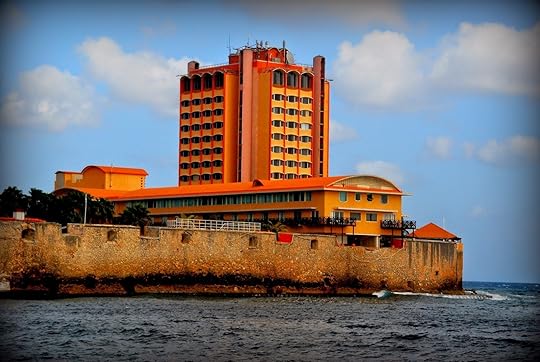 An 18th-century fort destroyed to make way for this
An 18th-century fort destroyed to make way for this
atrocity? F erfelu is an understatement.
I think it comes from the Dutch vervelend ([fur-FAIL-end], boring or annoying), but that may be just what passes for common sense inside my head. Another possibility is farfelu , French, which means eccentric, hare-brained, ridiculous, or bizarre.
Problem is, none of these definitions really fit the Papiamentu ferfelu.
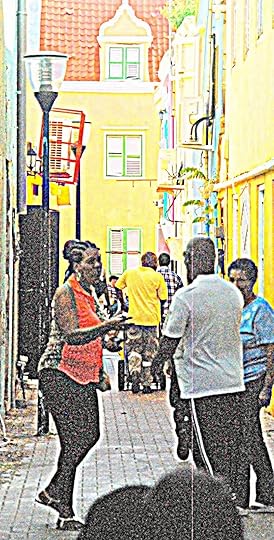 These people might be discussing,
These people might be discussing,
or arguing about, something
ferfelu. The argument itself
might become ferfelu, too.For instance, this video talks about a ferfelu situation being lived at a school in Bonaire last year: due to budget cuts, air conditioning* couldn't be used in classrooms during the first two hours of school. This website, aimed at sexually active teens and young adults, talks about how to prevent ferfelu experiences by making clear to your sex partner what you like--and what you don't.
In English, the closest would be disagreeable. Unpleasant. Objectionable. Unpalatable. Not really boring, or annoying.
Borrowing from examples in earlier posts (if you've been following this series):
Your best friend shows up to your coffee date in tears; she just broke up with her boyfriend. You: "Ai no, dushi. Ferfelu!"
(English: I'm so sorry to hear that. That's terrible.)
"How can politicians ever be honest? They're just the mouthpieces for big enterprise."
"Ei ta palu. Ferfelu, si."
(Enlgish: That's exactly the problem. Disgusting, yeah.)
Garbage in the streets is ferfelu. So are people that complain constantly. Or arguments that turn personal. Or loving someone that doesn't love you back. Or witnessing someone being fired. Or having to fire someone. (Or being fired yourself.) Or people talking at the movies--during the movie. Or a drunk at a party. Or...
What do you find ferfelu?
 This woman definitely finds something ferfelu.
This woman definitely finds something ferfelu.
I suspect it's me & my camera.
~ * ~
* Did you guess air-co (A/C) for erko in yesterday's post? Ei ta palu! And if you were the first to guess correctly in the comments, you've been entered to win a copy of The Miracle of Small Things, a collection of short stories set in Curaçao to be released later this year. Not every day will have a bonus word, but when there is one, if you're the first to leave a comment with the right answer (or, if no one gets it right, the one that comes closest by the time the next day's post is published), you'll be entered into the raffle. The three winners will be announced the first week of May.
Papiamentu borrows not just from Dutch (Papialands, Papiamentu + Nederlands) but from Spanish and English (Papianish? Englamentu?) on a regular basis. With time, some foreign words have become Papiamentized (my term)--incorporated into the language as more than just loans. Their spelling has changed, and, though usage, even their meaning has transformed.
Such is the case with ferfelu.
 An 18th-century fort destroyed to make way for this
An 18th-century fort destroyed to make way for thisatrocity? F erfelu is an understatement.
I think it comes from the Dutch vervelend ([fur-FAIL-end], boring or annoying), but that may be just what passes for common sense inside my head. Another possibility is farfelu , French, which means eccentric, hare-brained, ridiculous, or bizarre.
Problem is, none of these definitions really fit the Papiamentu ferfelu.
 These people might be discussing,
These people might be discussing,or arguing about, something
ferfelu. The argument itself
might become ferfelu, too.For instance, this video talks about a ferfelu situation being lived at a school in Bonaire last year: due to budget cuts, air conditioning* couldn't be used in classrooms during the first two hours of school. This website, aimed at sexually active teens and young adults, talks about how to prevent ferfelu experiences by making clear to your sex partner what you like--and what you don't.
In English, the closest would be disagreeable. Unpleasant. Objectionable. Unpalatable. Not really boring, or annoying.
Borrowing from examples in earlier posts (if you've been following this series):
Your best friend shows up to your coffee date in tears; she just broke up with her boyfriend. You: "Ai no, dushi. Ferfelu!"
(English: I'm so sorry to hear that. That's terrible.)
"How can politicians ever be honest? They're just the mouthpieces for big enterprise."
"Ei ta palu. Ferfelu, si."
(Enlgish: That's exactly the problem. Disgusting, yeah.)
Garbage in the streets is ferfelu. So are people that complain constantly. Or arguments that turn personal. Or loving someone that doesn't love you back. Or witnessing someone being fired. Or having to fire someone. (Or being fired yourself.) Or people talking at the movies--during the movie. Or a drunk at a party. Or...
What do you find ferfelu?
 This woman definitely finds something ferfelu.
This woman definitely finds something ferfelu.I suspect it's me & my camera.
~ * ~
* Did you guess air-co (A/C) for erko in yesterday's post? Ei ta palu! And if you were the first to guess correctly in the comments, you've been entered to win a copy of The Miracle of Small Things, a collection of short stories set in Curaçao to be released later this year. Not every day will have a bonus word, but when there is one, if you're the first to leave a comment with the right answer (or, if no one gets it right, the one that comes closest by the time the next day's post is published), you'll be entered into the raffle. The three winners will be announced the first week of May.
Published on April 07, 2015 09:14
April 5, 2015
Ei Ta Palu! (#AtoZChallenge 2015)
Ei ta palu!
[ATE-ah-PAH-loo]
(Literally: There's the tree.)

You've spent the whole afternoon trying to hang a painting straight, but every time you step back it looks crooked. Finally you ask a friend to help. "More to the right. No, a little to the left now. Just a smidge back to the--ei ta palu!" (English: That's it!)
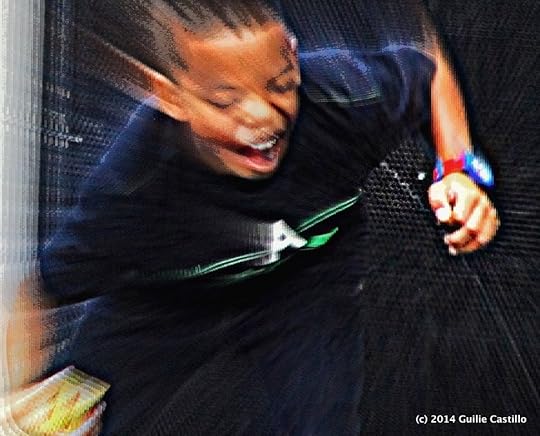
"How can a politician be honest? They're just the mouthpieces for big enterprise.""Ei ta palu."(English: That's exactly the problem.)
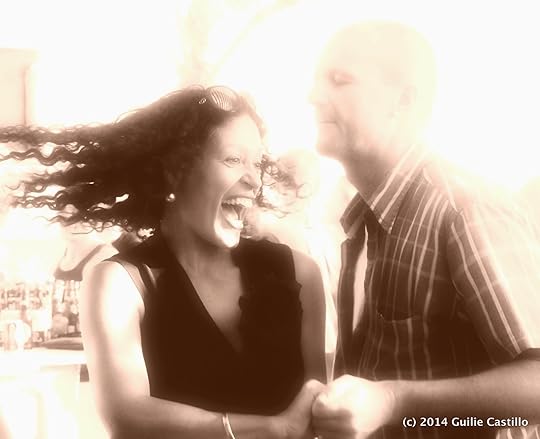
You've been taking months of salsa lessons and still can't get the rhythm right. Until, one day, your feet become independent of your OCD brain and--bam! Your teacher claps and says, "Ei ta palu!" (English: You got it!)
Bonus E word for today:
erko
Care to take a guess? It's an easy one... Just say it out loud, see what it sounds like. Leave a comment with your guess, and come back tomorrow to see if you were right!

You've spent the whole afternoon trying to hang a painting straight, but every time you step back it looks crooked. Finally you ask a friend to help. "More to the right. No, a little to the left now. Just a smidge back to the--ei ta palu!" (English: That's it!)

"How can a politician be honest? They're just the mouthpieces for big enterprise.""Ei ta palu."(English: That's exactly the problem.)

You've been taking months of salsa lessons and still can't get the rhythm right. Until, one day, your feet become independent of your OCD brain and--bam! Your teacher claps and says, "Ei ta palu!" (English: You got it!)
Bonus E word for today:
erko
Care to take a guess? It's an easy one... Just say it out loud, see what it sounds like. Leave a comment with your guess, and come back tomorrow to see if you were right!
Published on April 05, 2015 22:30



